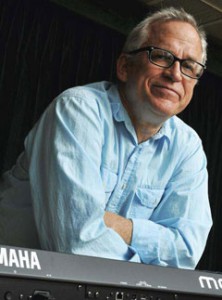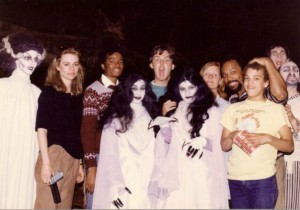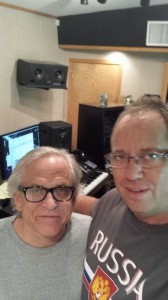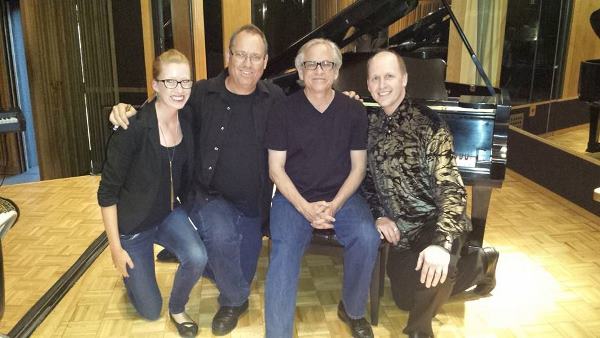On June 23-26 in Los Angeles, Brad Sundberg organized an exclusive series of In the Studio with Michael Jackson seminars called “The Homecoming”. A lot has already been written about Brad’s amazing seminars (check out our story about the ones in Saint Petersburg), and if you haven’t yet attended them, I can’t recommend it highly enough. But the ones Brad did in LA this year were special. Not only they took place in famous Westlake Studio D where Michael recorded his Bad album (hence the name “The Homecoming”), but this time Brad also invited some rare guests.
We attended the seminar on its last day, June 26. After the usual program presented by Brad, all the VIP attendees were treated to a dinner prepared by “Slam-Dunk sisters,” two lovely ladies who used to come and cook for MJ and his team during the studio sessions. The dinner consisted of salads, lasagne and banana pudding (with real bananas in it, as Michael liked it!) and was really delicious.
 At the dinner, we were joined by another special guest, songwriter and musician Steve Porcaro. Porcaro and his rock band Toto were Michael Jackson’s studio musicians throughout his solo career, from Off the Wall till HIStory album. But more importantly, Steve Porcaro is the author of three songs that Michael Jackson recorded. Two of them, “Human Nature” and “For All Time” are well known and loved by Jackson fans. The third one (the name of which you’ve probably guessed by now) had remained somewhat of a mystery.
At the dinner, we were joined by another special guest, songwriter and musician Steve Porcaro. Porcaro and his rock band Toto were Michael Jackson’s studio musicians throughout his solo career, from Off the Wall till HIStory album. But more importantly, Steve Porcaro is the author of three songs that Michael Jackson recorded. Two of them, “Human Nature” and “For All Time” are well known and loved by Jackson fans. The third one (the name of which you’ve probably guessed by now) had remained somewhat of a mystery.
So, imagine yourself in a dimly lit recording studio in front of a stage built for Michael to practice his dance moves. Behind us is the control room with hi-end audio equipment. Above us is Michael Jackson’s lounge (aka “the monkey room”) where Michael relaxed between takes and used to lock Bubbles for the time of the recording. On stage today are Brad Sundberg and Steve Porcaro.
As a way to introduce his guest, Brad Sundberg tells us that with Michael, it wasn’t always the most talented guy who got the job. Personal qualities were just as important. Studio environment requires team members to work closely and get along with each other, so Michael was looking for people who were sincere, professional, and fun to work with. And Steve, according to Sundberg, was the guy who ticked all the boxes (not to mention that he was, of course, amazingly talented). We quickly realize that it’s true. Steve Porcaro is a delightful person: charming, with a great sense of humor, and just a pleasure to listen to.

As a composer, Porcaro gets many questions about inspiration and the process of songwriting. He is asked if he writes songs in the same way as Michael did (who used to say that songs simply fell onto his lap.) Steve tells us that sometimes it happens like that, and a song comes to him in its entirety. More often though, it starts with a small piece — a hook, a melody, — and develops from there. He says that in the past, songwriting was a more inspirational, delicate process for him, and “stars had to be aligned” for a song to be born. Nowadays, he works on TV show scores and admits that is has disciplined him a lot. He says he has realized that it’s actually possible to write a song by a deadline.
Everyone is of course curious about the songs Porcaro wrote for Michael and how they came to be, so we move on to discussing “Human Nature.” Steve shares with us the story of the song creation. He actually wrote “Human Nature” about his daughter. His little girl once came back from school crying because a boy there was bullying her. “Why does he do it to me?” she couldn’t understand. Porcaro tried to explain to her that it must have been the boy’s way to show his interest, that it’s the way guys sometimes do it. Shortly after that, a melody came to him. Originally, the lyrics went,
I’ll tell her that it’s human nature
When she asks, “Why, why
Does he do it that way?”
He wrote verses in the same vein, recorded the demo on a cassette and presented the song to his band, Toto. But the band passed on the mid-tempo ballad. “We need more rock songs, songs that would play well on a stadium,” they told Steve. (The irony wasn’t lost on them when later, during the Victory tour, Michael used “Human Nature” as a promo-piece, and every TV channel broadcasted the song being performed on stadiums across America to the great delight and hysteria of the audience.)
So how did the song find its way to Michael Jackson? According to Steve, by mere coincidence. Quincy Jones tended to compartmentalize people’s roles in the studio. If you were an engineer, you weren’t a musician, and if you were a musician, you weren’t a songwriter. Steve Porcaro was, in his mind, a musician, so Quincy never asked him to write songs for Michael. The “songwriter” of Toto was David Page, and it was he who received an offer to submit material for Michael Jackson. David wrote a few grooves, but when it was time to send them to Quincy, he didn’t have an empty cassette at hand. So he took the cassette with Porcaro’s demos, including “Human Nature,” recorded his grooves on the other side of it, marked it as A side, and sent off to Quincy. The rest of the story is well-known: for whatever reason, Quincy left the cassette playing to its reverse side, heard the song and fell in love with it. Steve says that he likes to write songs with special, unusual atmosphere, and it was that atmosphere of “Human Nature” that won over Quincy.
Quincy didn’t dig the lyrics though. He gave the song to lyricist John Bettis who wrote new verses for it, and Porcaro admits that the result blew him away. Then Michael recorded it. According to Porcaro, it only took them a few takes. Steve was showing Michael how the phrasing should go, and Michael was repeating after him. He says, Michael sang the whole song from start to finish maybe just a couple of times.
Did the song undergo many changes from the demo to the finished version? Porcaro says, not a lot. Quincy liked the song as it was, and at one point Bruce Swedien even called Steve in the studio seeking help with the right accents on “why, why,” because they wanted to reproduce them exactly like in the demo. Porcaro remembers though that they did add a rhythm guitar part that he despised in the beginning. “Hated it. I thought it didn’t fit the song. Of course, 40 million records later I came to love it,» he jokes. «Now I think it’s the most brilliant guitar part ever written.”
Porcaro points out an interesting detail in the song — a barely noticeable background line where you can hear the word “around” (3:05-3:08 in the album track). He says the lyrics Michael’s singing are “she’s keeping him by keeping him around,” and it comes from his original demo.

So why on earth was it released on Thriller 25? Porcaro doesn’t have an answer. “They called me and told me, ‘We want to include your song on the Thriller Anniversary Edition,’” he remembers. “I said, ‘Of course Human Nature should be on it – it’s a part of the album.’ They said, ‘No, no, your other song, For All Time.’” He is still not sure whose decision it was, Michael’s or that of the record label.
And then, towards the end of the seminar Steve shared with us a gift that I will be holding very dear in my memory. In the beginning of our meeting, we asked him how many songs he wrote for Michael and how many of them Michael recorded. Steve replied that he submitted several songs, and Michael recorded “probably three.” I was holding onto the question about the third song and was going to ask it in the end of the seminar, but it turned out I didn’t need to. Steve volunteered the story.
After the Thriller album came out, during the Victory tour (or maybe right before it) Porcaro submitted a few grooves to Michael. Sometime later MJ called Steve and told him that he wanted to do something with one of them. Apparently, he had gone to the library and read on Chicago of the 1930s-40s, and that’s how he came up with an idea for the song. He and Porcaro met and recorded nine straight vocal takes for what would become “Chicago 1945.”
Of course, it’s impossible to describe music in text, but here are five things you need to know about “Chicago 1945”:
— The song is completed musically an vocally and perfectly releasable as is;
— It has no connection to “Al Capone” or “Smooth Criminal” (another myth) – a completely different and separate song;
— The lyrics tell a story about (three?) girls who went out at night and disappeared;
— It’s a catchy song. Not the level of greatness of “Billie Jean” or “Beat It,” but a solid groove. The hook (“Never to be found again… never to be found again”) was stuck in my head for 3 days after we had heard it;
— As the song was playing, I was trying to find another MJ song to compare it to. The closest I could come up with was “Behind the Mask” – the song is in the same tempo, and even the composition seemed somewhat similar to me. Although I think “Chicago 1945” is sung in a lower key – Michael’s voice is not as resonant as in “BTM.”
The sad thing is that everybody could have heard it by now if only the record label had been willing to do right by it. Porcaro was approached about the song for Xscape album, but he didn’t give his permission to use it. “It seems songs are going straight to remix these days,” he told us. It was obvious this approach didn’t sit well with him. And while a fan in me would have loved to be able to buy the song and have it in my collection, I felt nothing but respect for Porcaro’s position. I thought that as a musician and a songwriter, he must understand how much the integrity of a song means to the artist. And as a colleague of Michael, he undoubtedly knows how much Michael cared about his compositions. “Less is more” was a principle he, too, cited as very important for MJ and Quincy. “Chicago 1945” is a great song that certainly doesn’t need any “contemporizing” and deserves to be heard and appreciated in its own right.
Porcaro cannot release the song either without the approval of the Michael Jackson Estate, so for now the song remains in a deadlock. We can only hope that a time will come when Michael’s creative partners, his estate executors and the record label are able to see eye to eye about how the unreleased material should be handled. And for now we, fans, will take what we can get and be grateful for every opportunity to hear the original music Michael left behind. Thank you, Mr. Porcaro, it was an honor to meet you and hear all the stories and music you shared with us that evening.

Story by morinen
Photos with Brad and Steve Porcaro are from In the Studio with MJ facebook
So Brad mixed it all up, the background story of For All Time was actually for Human Nature (Porcaro’s little girl). A pity, because it fitted For All Time so well.
yep. I’m glad Porcaro clarified it, we need to be precise when it comes to art history :)
Thanks for this great post. I was at the seminar on the 23rd and also loved hearing from Steve Porcaro. Just to fill in a detail, the song that the words «for all time» appear in is «Wichita Lineman,» written by Jimmy Webb for Glen Campbell. Looking forward to reading more!
Thanks a lot! Did he play Chicago 1945 to you on the 23rd? I got the impression that he might have saved it for the last day, I wonder if it’s so.
I don’t recall hearing «Chicago 1945» on the 23rd. I believe Steve focused on «Human Nature» and «For All Time» with us.
Yes, I had the Human Nature story confused with For All Time… that has been corrected in the notes. Plus, now I have the For All Time story for future seminars! Steve only played Chicago 1945 on the last night — even I didn’t know he was going to do it! It was an amazing week — lots of memories and new friends, can’t wait for the next one.
Thank you Brad, it was an unforgettable day (two days!)
Aw, now I’m gonna be jealous that everybody got to hear Chicago 1945 and I didn’t! ))
Brad, is there a different story about For All Time, or is it just the one mentioned in this article?
Morinen, thank you for this. I was at the seminar on the 23rd also and even writing as fast as I could you filled in details that I didn’t get down (esp when it was too dark to see!). I so wish we could have heard the Chicago 45 demo but as compensation was especially thrilled to hear the demo of Streetwalker — a favorite of mine — and learn the details of Michael’s recording it. To be with people who were so close to Michael and hear such fascinating details of working with him was a dream — and then again with the incomparable Brad Buxer on Friday! It was an amazing day that took me many days to process and, in fact, I’m still processing. A true blessing.
Porcaro said he was a huge Jimmy Webb fan, and the song lyrics for, «Wichita Lineman» where he lifted the title has always been favorite lyrics of mine. The lyric is» «And I need you more than want you, and I want you for all time.».
I went on the 24th, so we didn’t get to hear, «Chicago 1945″ either, although Steve did tell us that it was going to be heard one day, so that gave me hope. Michael’s demos are better than most releases these days. I agree with Steve, they don’t need,»contemporizing.»
I was so angered when I watched the «making of» DVD that came with the deluxe version of, «Xscape». Some of those producers were all over themselves patting themselves on the back. L.A. Reid actually had the audacity to comment that they were able to make Michael’s demos, «listenable». REALLY? That man helped Jermaine Jackson write that horrible song disrespecting Michael, «Word to the Badd». He did that, and now he is the curator of all of Michael’s music?? What was The Estate thinking?? They should have chosen someone who had the utmost respect for Michael’s music and the integrity of his musical legacy.
I remember hearing one person say, that the «contemporization» was nothing more than putting Michael’s vocals on someone else’s music.
I agree completely with everything you wrote. Surprisingly, I’m not seeing many fans who view things this way.
Wow… I thought I was reading my own post as I read what you wrote about LA Reid and his audacity! Oh my God, every time I think of him bragging and claiming that he improved Michael’s songs, I wanna scream!! I get so fuming MAD!! The NERVE!! I lost all respect for him in that instant!! No wonder MJ didn’t continue his working relationship with him!! Grrrrr! What a pompous ass he turned out to be! I pray that he isn’t the curator of MJ’s music forever! — that it was just a temporary thing for the Xscape album!! He is completely undeserving!! No respect at all… just out for himself, to claim the riches of the true genius, Michael Jackson!! NOT RIGHT AT ALL!
While I do like some of the remixes, others made me so upset… (In my mind, they really ruined Do You Know Where You Children Are… and A Place With No Name, while fun to listen to, has the wrong beat and tone for the lyrics… :( ).The only consolation is that at least SONY had the sense to make the gold Deluxe edition with the originals on it!! A shame though that many will never hear them because they only bought the silver Standard edition of the album… :(
Anyway, re Steve Porcaro, I wish I could have heard Chicago 1945!!! I attended the June 24th Homecoming seminar, and the Bradx2 seminar, and that song was never mentioned! :( No fair!!
ONE day I hope…. :)
Thanks Shirley, and yeah, I think one day it all will be released. It’s just a matter of time.
Уведомление: Human Nature | Michael Jackson Zene Blog